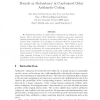Free Online Productivity Tools
i2Speak
i2Symbol
i2OCR
iTex2Img
iWeb2Print
iWeb2Shot
i2Type
iPdf2Split
iPdf2Merge
i2Bopomofo
i2Arabic
i2Style
i2Image
i2PDF
iLatex2Rtf
Sci2ools
115
click to vote
DCC
2007
IEEE
2007
IEEE
Bounds on Redundancy in Constrained Delay Arithmetic Coding
We address the problem of a finite delay constraint in an arithmetic coding system. Due to the nature of the arithmetic coding process, source sequences causing arbitrarily large encoding or decoding delays exist. Therefore, to meet a finite delay constraint, it is necessary to intervene with the normal flow of the coding process, e.g., to insert fictitious symbols. This results in an inevitable coding rate redundancy. In this paper, we derive an upper bound on the achievable redundancy for a memoryless source. We show that this redundancy decays exponentially as a function of the delay constraint, and thus it is clearly superior to block to variable methods in that aspect. The redundancydelay exponent is shown to be lower bounded by log (1/), where is the probability of the most likely source symbol. Our results are easily applied to practical problems such as the compression of English text.
Arithmetic Coding Process | Coding Rate Redundancy | Computer Graphics | DCC 2007 | Finite Delay Constraint |
Related Content
| Added | 25 Dec 2009 |
| Updated | 25 Dec 2009 |
| Type | Conference |
| Year | 2007 |
| Where | DCC |
| Authors | Ofer Shayevitz, Eado Meron, Meir Feder, Ram Zamir |
Comments (0)

